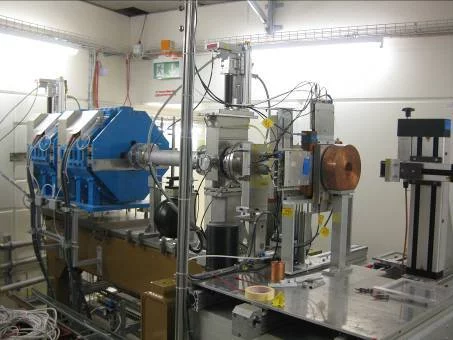Introduction
Under the contract between European Space Agency (ESA) and the Paul Scherrer Institute (PSI) the Proton Irradiation Facility (PIF) was constructed for testing of spacecraft components. The facility is designed in a user friendly manner and is commonly available. It enables generating of realistic proton spectra encountered at any potential orbit in space. PIF is a member of the ESA supported European Component Irradiation Facilities (ECIF)
Space Radiation - Demand for ground tests
The proton environment in space can have a detrimental effect on semiconductor components and other materials used in spacecraft. The ability to simulate this environment on earth enables projects to take this hazard into consideration in the design stage. Depending on the spacecraft orbit and duration the spectra will differ and one of the principal advantages of the PIF is its ability to reproduce them. The PIF has been originally implemented to investigate:
- Radiation hardness of the new electronic products
- Single Event Upsets (SEU) and Latch-ups (SEL) of electronic components
- Properties of radiation monitors for space and laboratory applications
- Basic mechanics of radiation effects in semiconductors
- Space radiation environment by on-earth simulations
User Lab Leading Features
The facility allows conducting of research on radiation-induced effects in electronics and devices. It not only enables experiments with realistic space proton environment but also provides mono-energetic beams for radiation hardness tests of materials. PIF is used extensively by the space community as well as by research teams in other disciplines. Our long-term experience with industries and space agencies provides extra benefits in field of applied science and technology. Several experiments in physics as well as testing and calibrating of modern particle detectors and radiation monitors have already been performed. A wide range of applications is feasible due to elementary design aspects assuring:
- A broad range of energies and intensities of the proton beam
- Experiment with adaptable monitoring of flux and dose
- Fast and uncomplicated experimental setup
- Transparent operating procedure
- User-friendly data acquisition system
- Flexibility towards customers' needs
As a prime user, the PIF is available for irradiation experiments connected with ESA space programs. Other tests are performed for the accelerator community such as CERN and related users. The facility is also commonly available for other applied research conducted by external laboratories, universities, and industry. These irradiations are performed in parasitic mode with other experiments. Because day shifts are reserved for biomedical applications, the irradiations are performed mostly during weekends and at short night shifts.
Short-duration experiments require only an irradiation request and order. Longer ones need approval by the Cyclotron Research Committee and PSI Technology Transfer Office.
